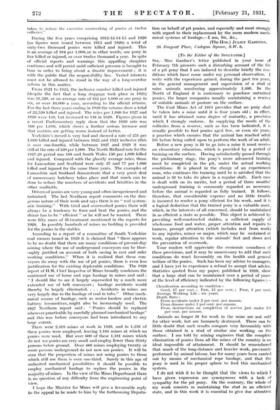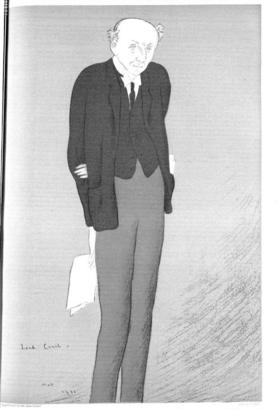[To the Editor of the SPECTATOR.] SIR,—Miss Gardner's letter published
in your issue of February 7th presents such a disturbing account of the life
of a pit pony that I am induced to describe briefly the con- ditions which have come under my personal observation. I write with the experience gained, during the past ten years, in the general management and supervision of a stud of mine animals numbering approximately 1,400. In the North of England it is customary to purchase untrained ponies, the larger companies usually maintaining a reserve of suitable animals at pasture on the surface.
The Coal Mines Act • of 1911 provides that no pony shall be taken into a mine until it is four years old ; in effect, until it has attained some degree of maturity, a provision which I strongly endorse. In supplying the needs of the collieries from a reserve, such as has been indicated, it is usually possible to find ponies aged five, or even six years, a practice which ensures that the animal has reached adult life before being called upon to perform the work of an adult.
Before a new pony is fit to go into a mine it must receive an elementary education, which is provided by a period of training on the surface. Having satisfactorily passed through the preliminary stage, the pony's more advanced training must be completed in the pit, under the actual working conditions. It is placed in the charge of an experienced man, who continues the training until he is satisfied that the animal is fit to take its place in a regular shift. Each case is dealt with on its merits, but a period of three months' underground training is commonly regarded as necessary before the animal is regarded as fully trained. It follows, therefore, that considerable expense and no little trouble is incurred to render a pony efficient for his work, and it is a logical deduction that the trained pony is a valuable asset, which, in the interests of all concerned, should be maintained in as efficient a state as possible. This object is achieved by providing well-constructed stables, a sufficient supply of wholesome food and water, proper attention and repairs- to harness, prompt attention (which includes rest from work) to any injuries, minor or major, which may be sustained at work, regular attention to the animals' feet and shoes and the prevention of overwork.
Your readers will appreciate the economic soundness of these provisions, and it may be unnecessary to add that such conditions do react favourably on the health and general welfare of the ponies. Such has been my advice to managers,
and I have yet to experience a refusal to accept that advice. Statistics quoted from my paper, published in 1929, show that a large stud can be maintained over a period of years at the level of efficiency indicated by the following figures :—
Classification according to condition :
Good, 87 per cent•. ; Fair, 12 per cent. ; Poor, 1 per cent.
Average Working Life : six years.
Death Rate :
From accidents under 3 per cent. per annum.
From disease under 1 per cent. per annum.
From destructions on completion of service just under 3.4 per cent. per annum.
Animals no longer fit for work in the mine are not sold for other work, but are humanely destroyed. There can be
little doubt that such results compare very favourably with those obtained in a stud of similar size working on the surface. I am told by mining engineers that the complete elimination of ponies from all the mines of the country is an ideal impossible of attainment. It should be remembered that much of the long-distance and heavier work, previously performed by animal labour, has for many years been carried out by means of mechanical rope haulage, and that the pony is used in his proper sphere to feed this mechanical system.
I do not wish it to be thought that the views to which I have given expression are synonymous with a lack of
sympathy for the pit pony. On the contrary, the whole of my work consists in maintaining the stud in an efficient state, and in this work it is essential to give due attention to humanitarian questions, for serious disregard of them must denote inefficiency. In conclusion I may say that my experience is not unique in the North of England.—I am, . - 30 Stanhope Road, Darlington.













































 Previous page
Previous page